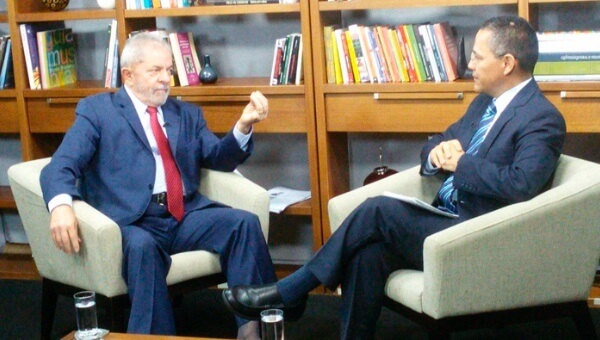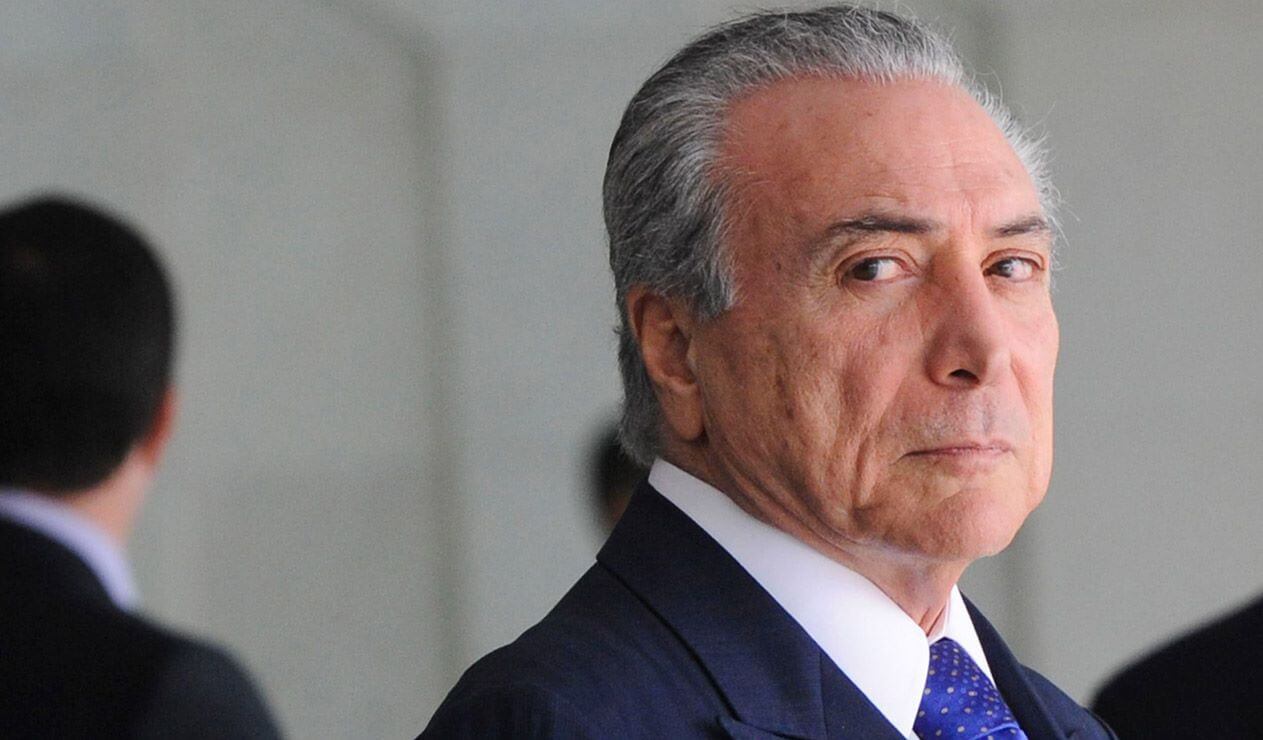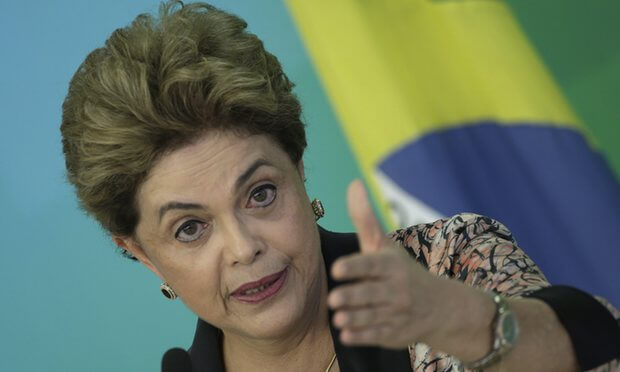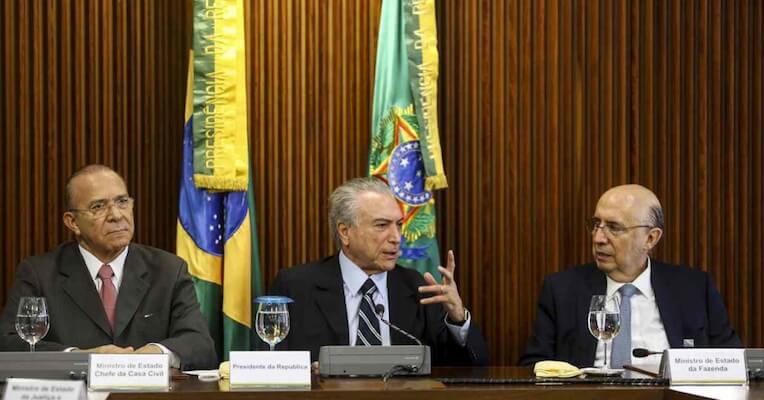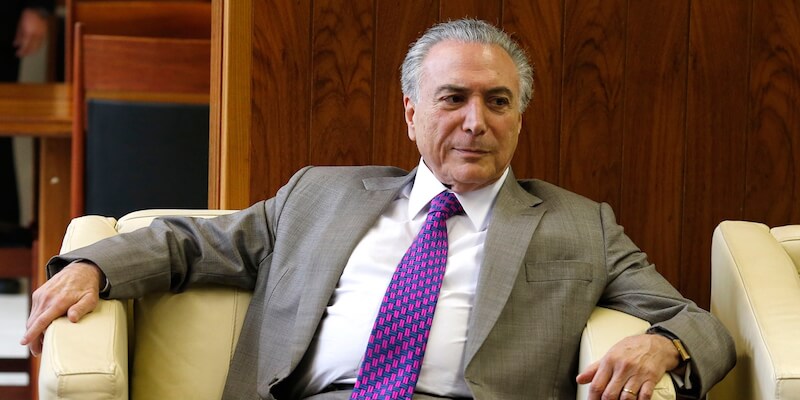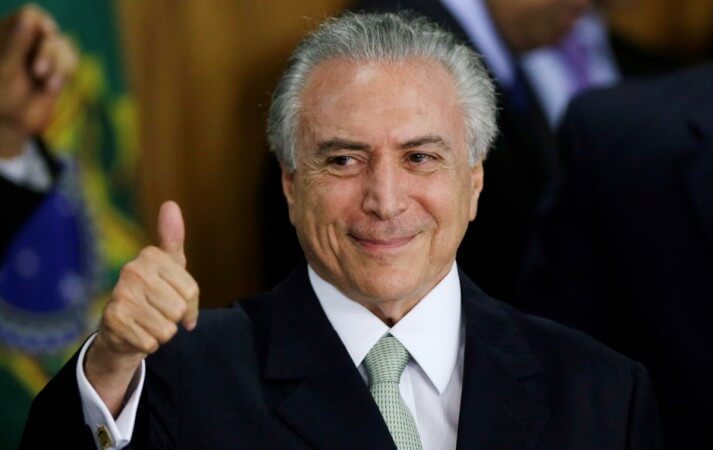Brazil is facing its worst political crisis in over two decades as opponents of Brazilian President Dilma Rousseff attempt to impeach her on corruption charges. But Rousseff is refusing calls to resign, saying the impeachment proceedings against her amount to undemocratic attempts by the right-wing opposition to oust her from power. On Wednesday, former Brazilian President Luiz Inácio Lula da Silva called the impeachment proceedings against Rousseff an attempted “coup d’état.” We speak to Pulitzer Prize-winning journalist Glenn Greenwald. His piece, “Brazil Is Engulfed by Ruling Class Corruption—and a Dangerous Subversion of Democracy,” recently was published by The Intercept.
TRANSCRIPT
This is a rush transcript. Copy may not be in its final form.
NERMEEN SHAIKH: We begin in Brazil, which is facing its worst political crisis in over two decades as opponents of Brazilian President Dilma Rousseff attempt to impeach her on corruption charges. But Rouseff is refusing calls to resign, saying the impeachment proceedings against her amount to undemocratic attempts by the right-wing opposition to oust her from power. On Wednesday, former Brazilian President Luiz Inácio Lula da Silva called the impeachment proceedings against Rousseff an attempted coup d’état. Lula, who was indicted last month on corruption charges, spoke Tuesday at a trade union event in São Paulo.
LUIZ INÁCIO LULA DA SILVA: [translated] The current attempt against Dilma is a coup. There’s no other word for it. It is a coup. And this country cannot accept a coup against Dilma. If there was one last thing I could do in my life, it would be to help Dilma turn this country around, with the decency that the Brazilian public deserves.
AMY GOODMAN: Last week, a judge suspended President Rousseff’s appointment of Lula da Silva to a Cabinet post. Rousseff says Lula will help strengthen her government, but critics see his appointment as a bid to protect him from what Lula says are politically motivated charges of money laundering. The judge who blocked Lula’s appointment had recently posted photos of himself on social media marching in an anti-government protest. Lula and President Rousseff are both members of the left-leaning Workers’ Party. On Tuesday, Brazil’s president, Rousseff, said she would not resign under any circumstances.
PRESIDENT DILMA ROUSSEFF: [translated] Those who call me to resign show the fragility of their conviction of the process of impeachment, because, above all, they are trying to instate a coup d’état against our democracy. I can assure you that I will not cooperate with this. I will not resign for any reason whatsoever. … I have not committed any crime under the constitution and law to justify an interruption to my mandate. To condemn someone for a crime that they did not commit is the greatest violence that can be committed against any person. It is a brutal injustice. It is illegal. I was victim to this injustice once, under the dictatorship, and I fought to never be a victim again, under democracy.
AMY GOODMAN: In recent weeks, mass protests have occurred in Brazil calling for President Rousseff to resign.
PROTESTER: [translated] The people are tired. The people don’t want this president, this Workers’ Party, this gang in power, anymore, this gang which only steals and conceals its illicit actions. The people are tired. Lula deserves to be in jail. That’s what he deserves.
AMY GOODMAN: Well, for more, we’re joined by Glenn Greenwald, the Pulitzer Prize-winning journalist based in Brazil. He’s been covering Brazil closely for The Intercept. His recent piece is headlined “Brazil Is Engulfed by Ruling Class Corruption—and a Dangerous Subversion of Democracy.” In it, Glenn Greenwald writes, quote, “this is a campaign to subvert Brazil’s democratic outcomes by monied factions that have long hated the results of democratic elections, deceitfully marching under an anti-corruption banner: quite similar to the 1964 coup.”
In a moment, we’re going to be talking with Glenn Greenwald about the attacks in Brussels, as well as the presidential elections here in the United States and the battle between Apple and the U.S. government over encryption. But right now we’re starting with Brazil.
Glenn, there is very little attention in the United States in the mainstream media about what’s taking place in Brazil. President Obama is right next door in Argentina, but can you talk about what is happening in the country you live in, in Brazil?
GLENN GREENWALD: Definitely. It is a little odd that such extreme levels of political instability have received relatively little attention, given that Brazil is the fifth most populous country in the world, it’s the eighth largest economy, and whatever happens there will have reverberations for all sorts of markets and countries, including the United States. The situation in Brazil is actually fairly complicated, much more so than the small amount of media attention devoted to it in the U.S. has suggested. The media attention in the U.S. has suggested that it’s the people, by the millions, rising up against a corrupt government, and sort of depicting it as the heroic population against a corrupt left-wing, virtually tyrannical regime. And in a lot of ways, that’s an oversimplification; in a lot of ways, it’s simply inaccurate. So let me just make a couple of key points.
First of all, it is the case that the Brazilian political class and its—the highest levels of its economic class are rife with very radical corruption. That has been true for a really long time. And what has happened is that Brazil’s judicial institutions and police agencies have matured. Remember, Brazil is a very young democracy. It only exited military dictatorship in 1985. And so you finally have the maturation of these institutions applying the rule of law. And so, for the first time, political and economic elites are being held accountable for very serious political and economic corruption. The corruption is pervasive in essentially every influential political faction in Brazil, including all of its political parties. That includes the Workers’ Party, the left-wing party of Lula and Dilma, the current president, but also, even to a greater extent, the opposition parties on the center and the right that are trying to replace it. So corruption is very real. There is a very—there’s been a—what has been, until recently, an impressive judicial investigation that has resulted in the arrest and prosecution of some of the country’s richest and most powerful figures—something that you would never see in the United States—billionaires being hauled off to jail for bribery and money laundering and tax evasion and corruption, and sentenced to many years in prison. And virtually every political opponent of President Rousseff is implicated by this corruption, and many of the people in her party are, as well.
The irony of this widespread corruption is that President Rousseff herself is really the only significant politician, or one of the only significant politicians, in Brazil not to be implicated in any sort of corruption scheme for the—with the objective of personal enrichment. Everyone around her, virtually, including those trying to bring her government down and accuse her of corruption and impeach her, is implicated very seriously in schemes of corruption for personal enrichment. She’s essentially one of the only people who isn’t implicated that way.
The problem is that there—at the same time as you have this massive corruption investigation, you also have an extremely severe economic recession, as the result of lowering gas prices and contraction in China and a variety of other factors. And up until very recently, up until 2008, 2010, Brazil’s economy was booming. The people of that country, including its poorest, have been—thought that their prospects were finally improving, that the promise of Brazil, the long-heralded promise of Brazil, to become this developed power in the world was finally coming to fruition. Millions of people were being lifted out of poverty. And what this recession has done has been essentially to reverse all of that and to reimpose huge amounts of suffering, borne primarily by Brazil’s lower and working classes. And so there’s an enormous amount of discontent and anger towards President Rousseff and towards her Workers’ Party over the suffering that the people in Brazil are experiencing. And so, what you have is this corruption scheme and corruption investigation and scandal at the same time as great economic suffering.
And in Brazil, there are really rich and powerful factions, who have long hated Lula and Dilma and the left-wing Workers’ Party, who haven’t been able to defeat them at the ballot box. The Workers’ Party has won four straight national elections, going back to 2002 when Lula was first elected. And so, what they are doing—and they’re using their extremely powerful media institutions, beginning with Globo, which is by far and away the dominant, most powerful media institution in Brazil, run by, like all Brazil’s significant media outlets, extremely concentrated wealthy families—are using this corruption scandal to—or using the anger towards the government to try and rile up people and essentially remove the Workers’ Party and President Dilma Rousseff from power, really because they can’t beat her at the ballot box. But they’re trying to latch on this corruption scandal to the discontent that people feel because of the economic suffering. And so there is a validity to the corruption scandal and to the investigation, even aimed at the Workers’ Party, but at the same time what you’re now seeing is, unfortunately, the judiciary, which has been pretty scrupulous until now about being apolitical, working with the plutocrats of Brazil to try and achieve a result that really is a subversion of democracy, which is exploiting the scandal to remove President Rousseff from power through impeachment, even though there really are no grounds of impeachment that would be legal or valid as a means of removing her from office.
NERMEEN SHAIKH: Well, one of the points that you make, Glenn, in that article is that—and I’m quoting you here—”Brazil’s extraordinary political upheaval shares some similarities with the Trump-led political chaos in the U.S.” Could you explain what you mean by that?
GLENN GREENWALD: Well, what I essentially mean by that is that in the U.S. there is political upheaval, in the sense that the political order has been largely overturned. The people who have been in control of and running the Republican Party, which are largely monied interests, have completely lost control of their political apparatus. They poured huge amounts of money first into Jeb Bush and then into Marco Rubio. And typically, those factions get their way. And in this particular instance, they haven’t. And you have this kind of political outsider who has been rejecting all kinds of political orthodoxies, breaking every political rule, who is looking closer and closer to becoming the nominee of the Republican Party and potentially, after that, the president of the United States, and has done so in a way that has unleashed all kinds of instability and very dangerous and dark sentiments in the United States.
In Brazil, the instability is far greater. I was just writing for an American audience, trying to get them to understand the level of instability by saying that, actually, what’s happening in Brazil is much greater in terms of the disruption than what’s happening as a result of Donald Trump’s successful candidacy, because it pervades almost every economic and political institution. And what you really see is this young democracy in Brazil that is now being threatened as a result of this really opportunistic and exploitative attack on the part of the country’s richest media outlets and richest factions to essentially undo the result of four consecutive democratic elections by trying to remove a democratically elected president—she was just re-elected in 2014—on totally fictitious grounds of pretext. And it’s really quite dangerous once you start, you know, sort of undermining the fundamentals of democracy in the way that’s currently taking place in Brazil.
AMY GOODMAN: You know, this is interesting that today President Obama is in Argentina, and it was Adolfo Pérez Esquivel, who won the Nobel Prize, Peace Prize, who said he welcomed Obama but thought that the American president should not be going to Argentina on March 24th, because that day, in 1976, 40 years ago, the military staged a coup. Human rights groups estimate something like 30,000 people were killed or disappeared in that coup that followed for the next seven or so years. Esquivel said, “I’m a survivor of that era, of the flights of death, of the torture, of the prisons, of the exiles. And,” he said, “when you analyze the situation in depth, the United States was responsible for the coups in Latin America.” What parallels, if any, do you see? And also talk about Petrobras and the role that it’s playing in all of this, the state oil company in Brazil.
GLENN GREENWALD: You can’t really understand Latin American politics, in general, and the ongoing instabilities and difficulties that almost every country in South America is still plagued by without talking about the central role that the United States has continuously played for decades in trying to control that part of the hemisphere.
In Brazil, like in so many countries, they had a democratically elected government in early 1960s, which the United States disliked because it was a left-wing government—not a communist government, but a left-wing government—that was devoted to the distribution of wealth for the social welfare, for opposing United States’ capitalistic interests and attempts to interfere in Brazil. And the Brazilian military, in 1964, staged a coup that overthrew that democratically elected government, and proceeded to impose on Brazil a really brutal military dictatorship that served the interests of the United States, was allied to the United States for the next 21 years. Of course, at the time, the United States government, U.S. officials, before Congress and in the public eye, vehemently denied that they played any role in that coup. And as happened so many times in the past, documents ultimately emerged years later that showed that not only was the U.S. supportive of that coup, but played a direct role in helping to plot it and plan it and stage it and then prop up that dictatorship for 21 years. That dictatorship used very extreme torture techniques on the nation’s dissidents, on the Brazilian citizens who were working to undermine that right-wing military dictatorship, among whom was the current president, Dilma Rousseff, who in the 1970s was a guerrilla, essentially, working against the U.S.-supported military dictatorship. She was detained and imprisoned without trial and then tortured rather severely. And the documents have revealed that it was the U.S. and the U.K. that actually taught the military leaders the best types of torture techniques to use.
And so, what you have now is not really a repeat of the 1964 coup. It’s not really responsible to say it’s identical to what’s taking place, because the impeachment against Dilma is proceeding under the constitution, which actually does provide for impeachment. There’s an independent judiciary that’s involved in the proceedings. But at the same time, if you go back and look at what happened in 1964 with that coup, the leading media outlets in Brazil, that also hated the left-wing government because it was against their oligarchical interests, justified and supported that coup. They depicted it as necessary to uproot corruption in this left-wing government. You had the same media factions—Globo, and the families who own it, and other media outlets that still persist to today—agitating in favor of the coup and then ultimately supporting the military dictatorship. And so you have similarities in terms of the anti-democratic processes at work that prevailed in 1964 and throughout Latin America in so many other years, where the United States was at the center of.
As far as Petrobras is concerned, Petrobras is the Brazilian-owned oil company, and it has become crucial to Brazil’s economic growth, because as oil prices increased and as Brazil found huge amounts of oil reserve, it was anticipated that Petrobras would essentially be the engine of Brazil’s future economic growth. And it started being drowned, essentially, in profits. And the scandal, the corruption scandal, has Petrobras at the center because it largely involves Petrobras paying bribes to various construction companies, that they would essentially hire private construction companies to build various platforms and other infrastructure for Petrobras for oil exploration, and they would essentially pay far more than what the contract really called for, and there would then be kickbacks to the head of the construction company, but also to Petrobras and to the politicians who control Petrobras. And that really is what this corruption scandal was triggered by, was the discovery of huge numbers, huge amounts—you’re talking about millions and millions of dollars in kickbacks and bribes to the politicians, in virtually every significant party in Brazil, that control Petrobras. Virtually nobody is unaffected by it. And the more they’ve investigated, the more people have turned state’s evidence, the more corruption has been discovered, to the point where even if you now do impeach Dilma, it’s almost impossible to envision somebody who could take her place who isn’t far more implicated in that corruption than she is.
AMY GOODMAN: Well, Glenn Greenwald, we are going to break, and then, when we come back, we’re going to move from Brazil to Brussels, to the attacks there and the response by the U.S. presidential candidates. We’re talking to the Pulitzer Prize-winning journalist Glenn Greenwald, co-founder of The Intercept. And we’ll link to hispiece in this segment, “Brazil Is Engulfed by Ruling Class Corruption—and a Dangerous Subversion of Democracy.” We’ll be back with him in a moment.
